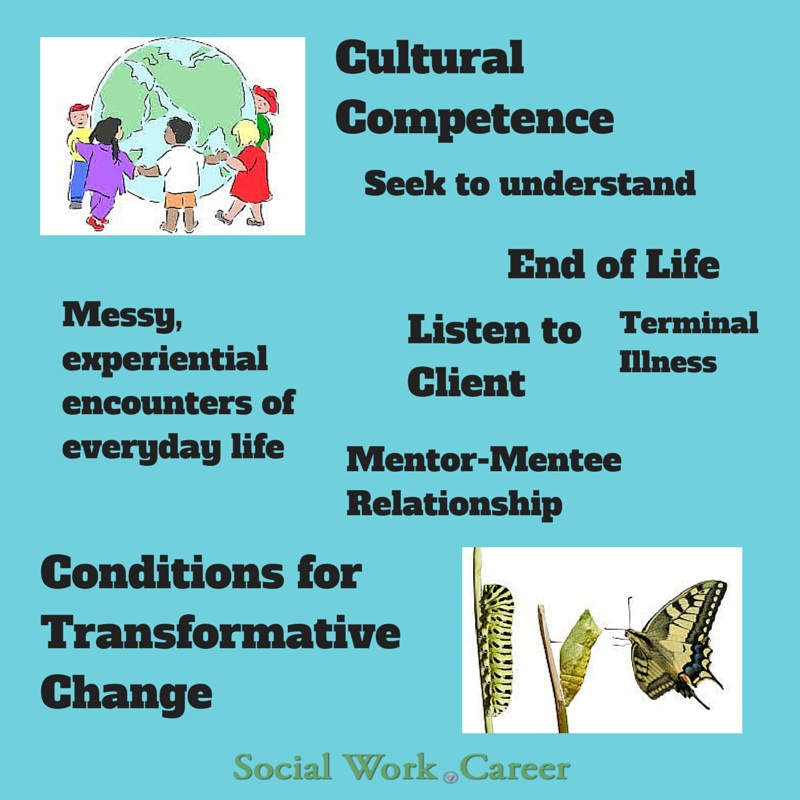Narrating Social Work Through Autoethnography – Book Review
Have you been looking for a good book to help you gain a deeper understanding of some topics particularly relevant to social work such as cultural competency, end of life, transformative change, and more?
If yes, you are likely to appreciate Narrating Social Work Through Autoethnography, edited by Stanley L. Witkin.
This is a unique collection of personal stories written by social workers in the format of an autoethnography, that is, whereby the author is both the main character and the narrator.
The writer conveys his/her understanding of a personal experience at the time it took place, as well as at the current time of writing the piece with a broader perspective of his/her past and the social and cultural context.
There are many pearls of wisdom to be gained from these heartfelt narratives that may help you not only become a better therapist, but also better understand parts of your own history.
This book has the following sections:
- Autoethnography: The Opening Act, by Stanley L Witkin
- Where’s Beebee? The Orphan Crisis in Global Child Welfare, by Katherine Tyson McCrea
- A Finn in India: From Cultural Encounters to Global Imagining, by Satu Ranta-Tyrkkö
- Being of Two Minds: Creating My Racialized Selves, by Noriko Ishibashi Martinez
- Learning From and Researching (My Own) Experience: A Critical Reflection on the Experience of Social Difference, by Jan Fook
- What Remains? Heroic Stories in Trace Materials, by Karen Staller
- What Matters Most in Living and Dying: Pressing Through Detection, Trying to Connect, by Brenda Solomon
- Will You Be with Me to the End? Personal Experiences of Cancer and Death, by Johanna Hefel
- Holding on While Letting Go: An Autoethnographic Study of Divorce in Ireland, by Orlagh Farrell Delaney and Patricia Kennedy
- The Pretty Girl in the Mirror: A Gender Transient’s Tale, by Allan Irving
- Reality Isn’t What It Used to Be: An Inquiry of Transformative Change, by Stanley L Witkin
- From Advising to Mentoring to Becoming Colleagues: An Autoethnography of a Growing Professional Relationship in Social Work Education, by Zvi Eisikovits and Chaya Koren
Below are a few examples of some of the valuable take-aways you may gleam from this book based upon the three sections highlighted in bold.
A few key take-aways about:
- Cultural competency
- End-of-Life issues
- Transformative change
Cultural Competency:
Seek to Understand vs. Achieve Competence
Racial Identification Is Contextual, Dynamic and Multidimensional
Born in Japan to a white American mother and a Japanese father, Martinez, in “Being of Two Minds,” shares how difficult and confusing it was to grow up as an outsider in both Japan and the U.S..
She provides examples illustrating how racial identification is contextual, as well as personal and social so that it is dynamic and multidimensional. She may feel and behave more Japanese in the presence of other Japanese, but still less “Japanese” than someone who was born and raised in Japan in a Japanese (only) family.
As Martinez notes, cultural competency is both difficult to define and attain. Some definitions focus on the functionality component, that is, having certain culture-related skills and knowledge while others tend to focus on avoiding prejudice and increasing awareness.
She suggests a more flexible and fluid variation for racial cultural competence based off of Dean’s view of culture (Witkin, 2014; p. 114) in which the goal is not to achieve competence but to participate in an ongoing process of seeking understanding and building relationships with others.
Martinez recommends that we constantly challenge our automatic categorical thinking (assuming people can be understood by their race alone) and enable our clients to be flexible in how they define themselves and ourselves.
End of Life Issues
You May Be Performing Your Job Correctly But Missing What Your Client Needs
Listen and Be Truly Present With Your Clients
Solomon, in “What Matters Most in Living and Dying,” is a social work professor who had to face her sister’s death from terminal cancer. She describes her appeal to the hospital social worker for assistance and her ultimate solitary experience in dealing with her impending loss.
The social worker was following all the evidence based practices and protocols, but this was at the expense of her being authentic and present for Solomon. Solomon did not need expert accounts or books on how to help her sister die. She needed her fellow social worker to be real with her and acknowledge what she was feeling at the time.
Transformative Change
Witkin, editor of this book, and author of “Reality Isn’t What It Used to Be, An Inquiry of Transformative Change,” teaches us valuable lessons through the story of his social work career trajectory and the birth of his third child.
You learn how society tries to segregate those with disabilities from others and how hard you have to advocate to change this, as well as other important advocacy considerations for this segment of the population.
You also have the opportunity to learn the required conditions for transformative change, one that Witkin underwent himself as a result of the disabilities his third child was born with in the face of an educational system running counter to what he believed would be best for his son.
The 4 Conditions for Transformative Change Are:
- An incentive to change that is stronger than the tendency to keep things as they are
- An awareness that certain assumptions, beliefs and understandings are linked to a concerning situation
- Identification and availability of a beneficial alternative
- The need for social support (mentors or experienced others can facilitate this process)
Gaining an understanding of some of the complexities of change from Witkin’s narrative is particularly helpful in light of the fact that we typically work with individuals who express a desire to change.
This facilitates our understanding of what type of support and encouragement our clients will need in order to make either a “first-order” change in which their assumptions and beliefs remain intact, or a “transformative” change in which a desired change involves a shift in their underlying belief system.
In sum, I highly recommend this book for social workers, other mental health and helping professionals, as well as the broad public. These moving stories bring to life some of the dilemmas and challenges that many of us go through, and provide strategies of how one may cope with them.
Last but not least, we are introduced to people who are different from us in some ways; their narratives illustrate everyone’s need to be listened to and understood for who they are (and not who we may think they are).
What are your thoughts about this book and/or this way of looking back at your past experiences ? Please share your comments below 🙂
Did you find this post helpful? If yes, could you please “like” and/or “share” it with others? Thanks!
Disclosure of Material Connection: I received one copy of the book mentioned above for free in the hope that I would mention it on my blog. In addition, the link to this book is an “affiliate link.” Regardless, I only recommend products or services I use personally and believe will be good for my readers. I am disclosing this in accordance with the Federal Trade Commission’s 16 CFR, Part 255: “Guides Concerning the Use of Endorsements and Testimonials in Advertising.”




Hi Dorlee,
This book sounds like a must-read for social workers. Much can be learned from the cultural perspectives of people working in the social work field in other countries, which can then be of assistance when working with an emigrant from that particular country.
For anyone looking to change and grow, the Four Conditions for Change is a great reminder.
Hi Marianna,
Yes, I agree that “Narrating Social Work Through Autoethnography” has so much to offer mental health professionals.
I love the four conditions to change – we so often minimize what is involved or needed to sustain long term deep change and the editor’s illustration and conditions highlight just how important getting a new community or a mentor who may support your change is etc.
Thanks so much for taking the time to share your thoughts!